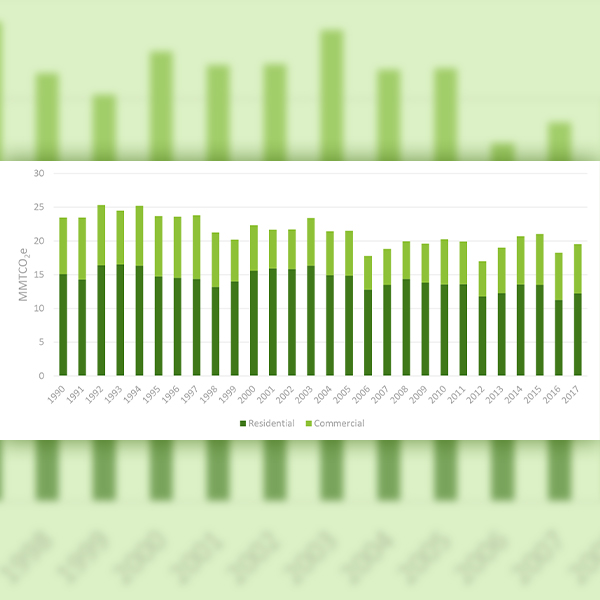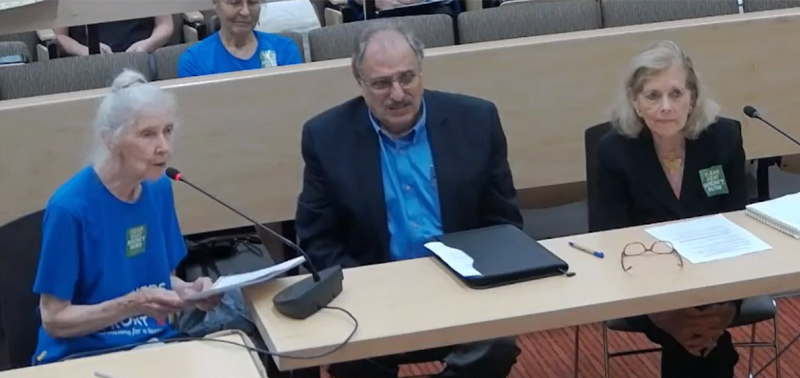
The Massachusetts Joint Committee on Telecommunications, Utilities and Energy (TUE) held hearings last week on several bills that would expand the state’s 10-municipality demonstration project allowing cities and towns to ban fossil fuels in new buildings and major renovations.
The TUE Committee also took public testimony on a range of bills promoting building electrification and targeting fossil fuel consumption in buildings more broadly as the state looks to cut building sector emissions and meet its statutory climate goals.
Climate, public health and environmental justice advocacy groups spoke in favor of bills promoting electrification, while they opposed bills that would promote the use of biomethane or blended hydrogen in buildings.
Representatives from the gas, biofuel, heating oil and real estate industries, along with labor groups representing gas workers and plumbers, generally opposed the electrification bills and supported the inclusion of alternative and low-carbon fuels in building decarbonization programs.
The committee helped to craft an omnibus climate bill in 2022 that created a demonstration project allowing 10 municipalities in Massachusetts to ban fossil fuel combustion in nearly all new buildings. State law prohibits most towns from implementing all-electric building codes, based on a ruling by former state Attorney General Maura Healey (D), who is now governor.
Clean energy advocates are now pushing to expand the 10-town program, with many hoping to expand the option, or even pursue an all-electric code for new buildings, statewide. The 10-town limit agreed upon in the previous session was a political compromise between the legislature and then-Gov. Charlie Baker (R). Advocates hope the changing political makeup of the state, along with the ever-increasing need to reduce emissions, will spur the program’s expansion.
“We all know the urgency of action,” said Northampton City Councilor Alex Jarrett. “On Monday, I stood next to a farmer as she watched her equipment and her crops get washed away by what looks to be the third-highest flood event since 1950 on our local Mill River. All of her effort for the season was gone in a few minutes.”
Representatives of cities including Northampton, Salem, Somerville and Worcester expressed their desire to join the demonstration project, but they worried they will be unable to if it is not expanded. The demo gives priority to the 10 municipalities that pursued local bans prior to the 2022 law. Nine of the 10 municipalities are likely to be included in the project, leaving one open spot for additional applicants. And Boston also has expressed its interest in joining.
“It doesn’t make sense to build new buildings that will need to be retrofitted before the useful life of their heating, cooling and cooking infrastructure is through,” Jarrett said.
Advocates argued that it is unfair to allow disproportionately wealthy, white communities to participate in the demonstration project while lower-income communities of color are excluded.
“We’re a major environmental justice community; we shouldn’t have to wait,” said Worcester City Councilor Etel Haxhiaj, noting that the impacts of climate change disproportionately impact vulnerable low-income, nonwhite and disabled residents.
“Without state authorization to restrict new fossil fuel infrastructure in our city, we are completely unable to address our most significant source of emissions: our buildings,” Haxhiaj said.
Along with the need to reduce emissions, advocates for expanding the program cited the public health risks of burning fossil fuels like natural gas and propane in buildings.
“The evidence for the harms of gas stoves in homes related to pediatric childhood asthma is robust and has been well known for quite some time, with an increased risk of 42% in children that live in homes with gas stoves,” said Dr. Wynne Armand, associate director of the MGH Center for the Environment and Health and assistant professor at Harvard Medical School.
Armand highlighted a recent study that found gas stoves release significant levels of the carcinogenic chemical benzene during combustion, as well as a 2022 study that found uncombusted gas in the Boston area contained 21 chemicals known to be toxic to humans.
“This is an equity issue,” Armand said, speaking about her experience practicing primary care in Chelsea. “I see this every day, where my community has one of the highest rates of asthma in children, as well as the worst asthma outcomes and higher [emergency department] visits.”
Sen. Mike Barrett (D), chair of the TUE Committee, expressed his support for expanding the demonstration project and said he was in favor of allowing more towns to join during last year’s legislative session.
“Ten isn’t arbitrary, and it wasn’t the number favored by original proponents; it was what we could get,” Barrett said, adding that the legislation promoting the demonstration project originated in the Senate and that proponents may face greater opposition in the House of Representatives.
Meanwhile, those opposing the demo’s expansion include National Grid; the Propane Gas Association of New England; the Massachusetts Energy Marketers Association; the real estate association NAIOP; the Homebuilders and Remodelers Association of Massachusetts (HBRAMA); the Northeast Hearth, Patio and Barbecue Association; Plumbers & Gasfitters UA Local 12; and United Steelworkers Local 12012.
“We urge you to think twice and go slow before expanding the 10-community fossil fuel ban program because of the difficulties that already homebuilders are running into trying to electrify our homes,” said Benjamin Fierro, a lobbyist testifying on behalf of HBRAMA.
Fierro highlighted the results of an industry-sponsored report from the Wentworth Institute of Technology, Massachusetts Institute of Technology and HBRAMA that found that the state’s ‘municipal opt-in specialized stretch energy code’ — which features strict energy-efficiency standards but stops short of mandating electrification of new buildings — could increase the total costs for the construction of single-family homes by 1.8 to 3.8%.
Andrew D’Angelo, executive director of the Greater Boston Plumbing Contractors Association, argued that his organization was not coming to legislators “as shills to the fossil fuel industry or large corporations. We come here as working people and contractors that employ those people with concerns that some legislation, while well intended and altruistic, will come with some unintended consequences for families across the state.”
Tim Fandel of Local 12 advocated for an “all-of-the-above approach” to reducing emissions.
“In the absence of utilizing every option we have at our disposal, there is a real risk in not achieving the intended objectives — and yes, natural gas will play a role in our energy portfolio for many years to come,” Fandel said.
Kevin O’Shea, director of government affairs at National Grid, echoed this position, opposing the expansion of the 10-town demonstration project along with legislation that would impose a clean heat standard on the state’s gas utilities. The proposed standard would not allow utilities to comply using fuels like biomethane or blended hydrogen.
“It is too early to take viable decarbonization off the table that may be needed to meet the 2050 net-zero targets,” O’Shea said.
Ben Butterworth, director of climate, energy and equity analysis at the Acadia Center, argued that blending biomethane — also known as renewable natural gas (RNG) — and hydrogen into the gas network “would significantly impair the state’s ability to cost-effectively decarbonize the building sector.”
Citing the “optimistic” estimates of the American Gas Foundation, Butterworth said biomethane from waste sources could cover only about 5% of current U.S. gas demand.
“Increasing RNG production beyond this level would require the use of highly controversial resources including energy crops and gasification of agricultural and forest residues. These forms of RNG production that rely on the intentional production of methane simply shouldn’t be on the table,” Butterworth said, citing the “lack of any clear GHG-reduction benefit and tradeoffs associated with land, water use and food production, to name a few.”
As legislators consider a clean heat standard bill, the Massachusetts Department of Environmental Protection (DEP) has also begun developing a clean heat standard while soliciting public feedback featuring many of the arguments that played out in the TUE hearings. (See Mass. Stakeholders Debate the Scope of Clean Heat Standard.)
Opponents of the legislation argued that the development of the standard should be left to the DEP, while advocates said the bill would provide important guardrails for which compliance pathways are included in the standard.




